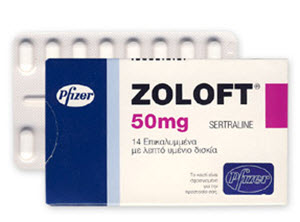 Type: SSRI
Type: SSRI
Active ingredient: Zoloft
Common use: Zoloft is a selective serotonin re-uptake inhibitor (SSRI) chiefly used to treat depression, panic disorder, obsessive-compulsive disorder (OCD), post-traumatic stress disorder (PTSD), social anxiety disorder, and premenstrual dysphoric disorder (PMDD).
How to use: Unless otherwise ordered by your doctor, Zoloft should ideally be taken at roughly the same time very day.
It can take several weeks before Zoloft reaches its full effect. It is important to keep taking the medicine even if you do not notice any immediate improvement. It also important to continue to take Zoloft even when you feel well. Do not stop taking Zoloft without consulting your doctor. It is safer to gradually decrease the dose of Zoloft than to stop abruptly.
If you miss a dose of Zoloft, take it as soon as possible. If it is almost time to take your next dose, skip the missed dose permanently and stick to your regular dosing schedule. Do no take two doses at once or near each other in time.
How to store: Store Zoloft at room temperature in a tightly-closed container, and keep away from heat, light and moisture.
Warnings:
- Do not use Zoloft if you are allergic to any of the ingredients.
- Examples of symptoms of an allergic reaction are a rash, itching, swelling, severe dizziness and trouble breathing. Seek immediate medical attention if you experience symptoms of an allergic reaction to Zoloft.
- It is important to keep all doctor appointments and laboratory appointments while being treated with Zoloft.
- Zoloft can cause drowsiness. Do not drive, operate machinery or do anything else that could be dangerous until your know how you react to Zoloft.
- Seek immediate medical attention if you experience seizures.
- Contact your doctor as soon as possible if you experience increased sweating, changes in sexual ability, changes in sexual interest, prolonged erections, painful erections, tremors, unusual mood changes, muscle cramps, or loss of appetite.
- Other medicines (prescription medicine as well as over-the-counter medicine) can impact your reaction to Zoloft. Do not take Zoloft together with any other medicine without consulting your doctor first. Be especially cautious with medicines that may cause drowsiness.
- Alcohol, even in small amounts, can impact your reaction to Zoloft. Zoloft will add to the effects of alcohol and other depressants.
- Caution is advised for the elderly, since they may be more sensitive to the effects of Zoloft. Be vigilant of decreased sodium levels in the blood, especially when Zoloft is combined with diuretics.
- Compared to adults, children are more likely to lose their appetite and lose weight when treated with Zoloft. It is important to monitor weight and growth in children treated with Zoloft.
- If you are pregnant or planning to become pregnant, discuss the risks and benefits of Zoloft. with your doctor. The risks usually outweighs the benefits for the third trimester.
- It is unknown if Zoloft is excreted in breast milk. Discuss the risks and benefits with your doctor before breastfeeding while being treated with Zoloft.
Examples of reported side effects of Zoloft:
- Nausea
- Upset stomach
- Diarrhea
- Dry mouth
- Increasing sweating
- Drowsiness
- Trouble sleeping
- Tremor
- Loss of appetite
- Weight loss
- Rapid weight gain
- Decreased interest in sex
- Decreased sexual ability
- Prolonged erection
- Painful erection
- Unusual mood changes
- Seizures
- Itching
- Swelling
- Rash
- Trouble breathing
